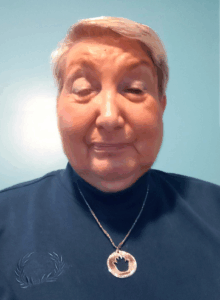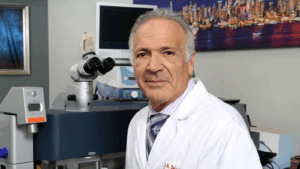Corneal transplant recipient Rosalie Rhodes is grateful for the gift of sight from a young man she will never meet. She hopes to one day thank his family in person for their generous organ donation.
Bell’s Palsy Leads to Corneal Damage

The disorder made closing her left eyelid difficult, leading to exposure keratitis, a condition where the cornea dries out. The cornea is the clear, outer layer of the eye’s focusing system.
A specialist sewed her left eye closed to allow it to heal, but her vision did not improve. Rhodes’ condition deteriorated further and eventually resulted in vision loss.
“My vision was so impaired,” Rhodes said. “They decided that I needed a corneal transplant.”
Rhodes was referred to ophthalmologist Joseph A. DeLuca, MD, FACS, for evaluation.
“She developed an ulcer of the cornea inside the eye because she could not close her eyelid,” Dr. DeLuca explained. “They treated the ulcer until she was healed, but that left a scar. It left neovascularization of the cornea. Her sight was compromised a great deal.”
Corneal neovascularization refers to the abnormal growth of blood vessels in the cornea. In some cases, this condition can result in corneal swelling and vision loss.
After her eye exam, Rhodes and Dr. DeLuca discussed her options for treatment.
“[She] could have left it alone, and then the vision would have just been what it was, but she was motivated,” Dr. DeLuca said. “She chose to have a corneal transplant.”
Corneal Donation Needed for Transplant Surgery
Corneal transplant surgery, or keratoplasty, replaces a damaged or diseased cornea with healthy corneal tissue from an organ donor. Doctors perform more than 40,000 corneal transplants every year in the U.S.
To treat her left eye, Rhodes needed a penetrating keratoplasty (PK). Her surgeon would remove her damaged cornea then sew a clear donor cornea into place. Full vision recovery can take up to a year for some patients.
“The patient has to agree that when you do a full thickness [corneal] transplant, there’s a lot of post-operative care,” Dr. DeLuca said.

Filled with mixed emotions, Rhodes reported the next day to River Drive Laser and Surgery Center in Elmwood Park, New Jersey, for her corneal transplant.
“He wasn’t 70 years old or 50 years old; he was 24,” she said. “I am so grateful to the parents; they were so incredibly wonderful to do this.”
The procedure was complicated but successful. She returned a day later for a post-op exam with Dr. DeLuca.
A New View Through A Gift of Sight
Over 97 percent of all corneal transplant operations successfully restore the recipient patient’s vision. Rhodes is one of them.
“I could see! That was the first thing,” Rhodes said. “I was able to see color. I can see letters if they’re dark and on a light background. I will never have vision like I had prior to all of this, but it is a thousand percent better than I anticipated.”

“She’s a grand slam. She’s not wearing glasses, and she’s 20/25 after full thickness keratoplasty. Just exceptional,” he said. “It just went flawlessly, really.”
Rhodes said she appreciates Dr. DeLuca’s expertise and professionalism to restore her vision.
“I am so grateful to him and God,” she said. “I had God on my shoulder and so did he.”
As her recovery continues, Rhodes will never forget who made her corneal transplant possible. She wrote a letter to the family thanking them for their donation and submitted it to the eye bank for delivery.
“They gave me a chance to see out of that eye. I can’t thank them enough,” she said. “My heart goes out to them for their loss.”
Choose an ASC for Your Eye Surgery
Following her successful corneal transplant, Rhodes recommends eye surgery at an AMSURG ambulatory surgery center (ASC).
“I would recommend River Drive any time of the day or night,” she said. “They were so wonderful before the surgery, during [and] after.”
ASCs are outpatient facilities that offer the following benefits:
- Same-day, high-quality surgical procedures with the most advanced technologies available
- A home-like setting with convenient parking
- Significantly lower costs than other facilities for the same procedure
- The convenience of recovering at home
Schedule Your Annual Comprehensive Eye Exam
Annual comprehensive eye exams with dilation can prevent conditions like glaucoma, macular degeneration and cataracts before they impair your vision. During May – Healthy Vision Month – consult your eye specialist regarding the frequency of preventative vision check-ups.
“Don’t wait to see the ophthalmologist when you do have a problem,” Dr. DeLuca advised.
If you are not under the care of a board-certified ophthalmologist, we can help you find an eye doctor in your area who is accepting new patients. You deserve the best eye care. Call today for an appointment.
This article is designed for educational purposes only. The information provided should not be used for diagnosing or treating a health concern or disease. It is not a substitute for professional care. If you have or suspect you may have a health concern, you should consult your healthcare provider.
